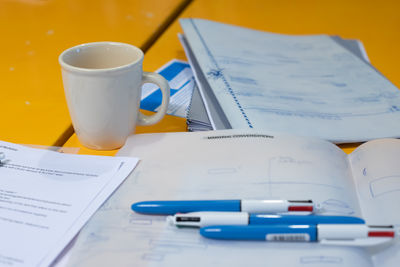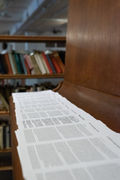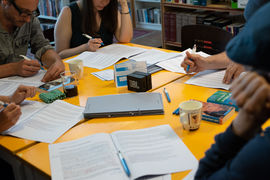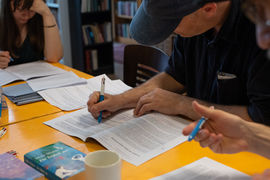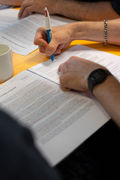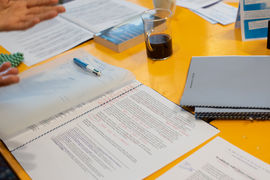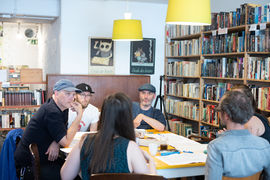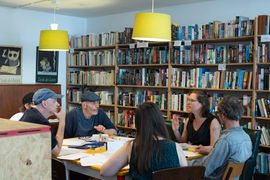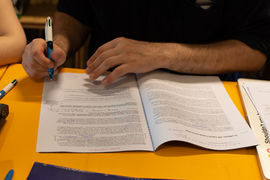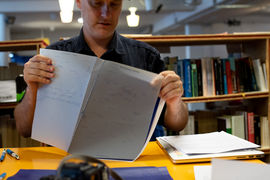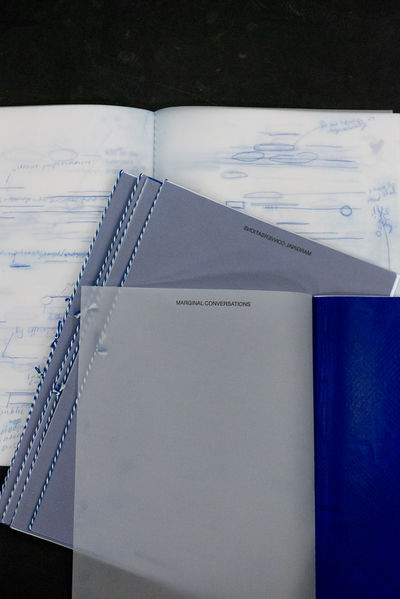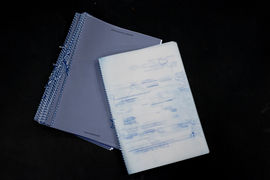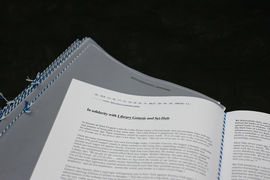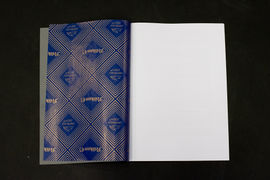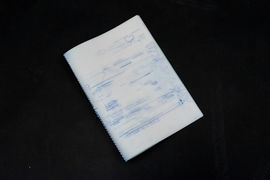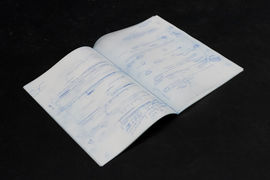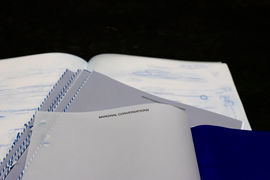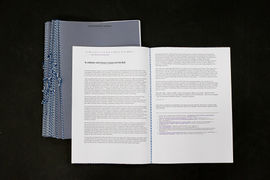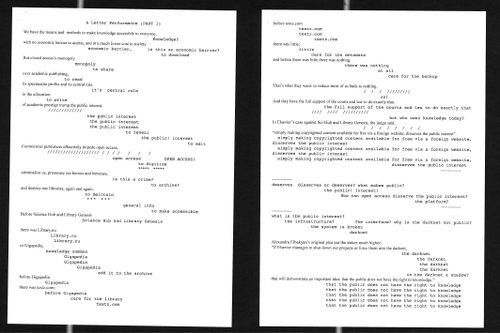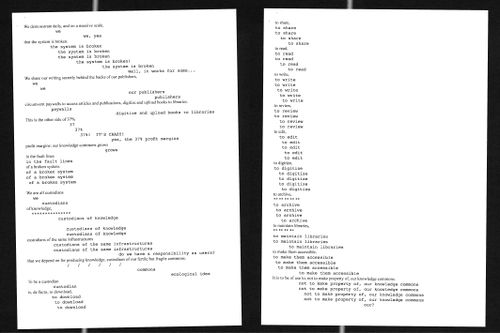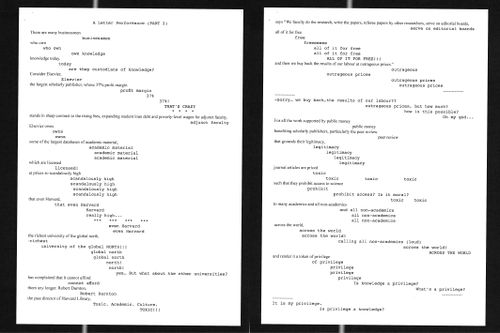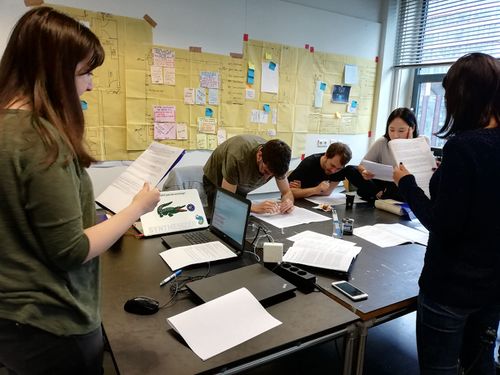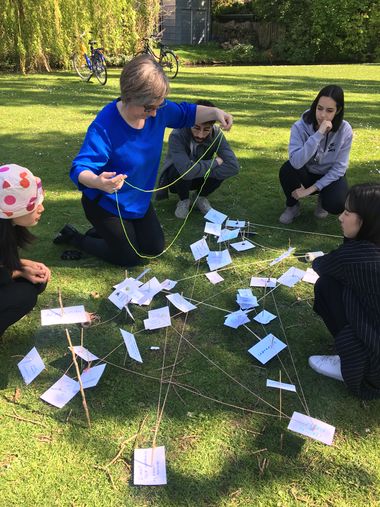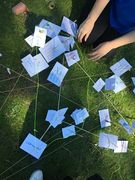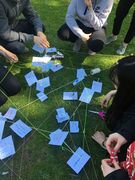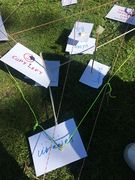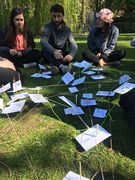User:Artemis gryllaki/Special Issue 9: Difference between revisions
No edit summary |
No edit summary |
||
| (44 intermediate revisions by the same user not shown) | |||
| Line 1: | Line 1: | ||
'' | =The Library Is Open | Interfacing the Law= | ||
Rotterdam, 3 July 2019<br><br> | |||
''Dear readers,<br><br>[[File:workshop.jpg||400px|frameless|right|link=]] | |||
In the spring and summer of 2019 we developed The Library Is Open, a publication which focuses on the operations, actions, and roles of legal and extra-legal libraries. Central to this project is the community that forms around a collection of texts – the custodians of the collection and the readers.<br><br> | |||
The Library Is Open is the result of the third iteration of Interfacing the Law, an ongoing research project between XPUB and Constant (BE), which explores issues around extra-legal libraries, software and legal interfaces and intellectual property. Led by our guest editor Femke Snelting, we participated in many activities which were organised by invited guests:<br> | |||
With Bodó Balázs, an economist and researcher on shadow libraries, we analysed the gargantuan dataset of Library Genesis, to determine trends which indicate access to texts and the social, geo-political and economic aspects at play
. <br> | |||
With Anita Burato and Martino Morandi at the Rietveld Library in Amsterdam, we discovered the subjectivity of subjects and thorny issues of classification and representation
. <br> | |||
With other readers, we deepened our understandings of texts through collective annotations.<br> | |||
With artist and researcher Eva Weinmayr, who introduced us to The Piracy Project, we examined the possible motivations and differences between pirated books and their "source".<br> | |||
With open-source software such as Tesseract, pdftk, and LibreOffice (and many others) we explored the technical processes used during the creation of pirate libraries, and the hidden labour involved in this.<br> | |||
With fellow pirates, we considered the multiplicity of roles and activities involved in maintaining various libraries, such as Monoskop, Libgen, Aaaaaarg, Sci-Hub, Memory of the World, Project Gutenberg, +++.<br> | |||
With Dušan Barok, the administrator of Monoskop and an alumnus of the Piet Zwart Institute, we discovered how Monoskop was initiated and how it has changed over time.<br><br> | |||
The variety of our collective sessions, and the practical exercises we performed led us to organise an afternoon of three workshops that directly address the active role of piracy, rather than simply talking about it. Encouraging small, informal, collective actions, we wanted to challenge the ordinary, hierarchical presentation of research projects in the academic context, and individual notions of authorship.<br> | |||
When choosing a suitable venue for our event, we decided to ask Leeszaal (in Dutch "Reading Hall") to host our workshops. Situated in a busy, multicultural area of Rotterdam, Leeszaal exemplifies many values we sympathise with, particularly open access to knowledge, and a focus on the community that uses the space, not just for reading but for many other social purposes. These values we recognise (somewhat nostalgically) as reminiscent of public libraries of yesteryear. However, the landscape today is quite different, with huge online commercial repositories of texts (e.g. JSTOR), protected by paywalls which limit access to them, and in response the emergence of "shadow libraries".<br><br> | |||
In the following pages we invite you to wander through the dilemmas, outcomes and reflections that came out of our three different workshops, and interviews with people whose work is at the centre of the issues that each workshop uncovers.<br><br> | |||
Knowledge In Action explores the roles and activities within libraries, such as selection and inclusion of books. Interview with: Dubravka Sekulić & Leeszaal staff.<br> | |||
Blurry Boundaries reveals the hidden processes and labour between the publishing and distribution of physical and digital books. Interview with: Dušan Barok.<br> | |||
Marginal Conversations highlights the sociality of texts, and how they can become conversations through collective reading, annotation and performance. Interview with: Marcell Mars.<br><br> | |||
Yours in piracy, XPUB'' | |||
==Marginal conversations== | |||
''Marginal Conversations'' is a workshop which explores collective reading, annotating and performing texts. We read, and write notes in the margins; usually in private, isolated from other readers. We come across texts with others' notes on them; the author unknown, their thoughts obscure. What happens when we share our notes, vocalise and perform them?<br> | |||
In this workshop, participants read, annotate and discuss the open letter "In Solidarity with Library Genesis and Sci-Hub", which asks for pirate library practices to come out from the shadows. This letter was selected for many reasons; it was an introduction for us to the thematic "Interfacing the Law", it's available in many languages, and presents an argument that generates interesting conversations. We compare annotations to detect common areas of interest and to also explore different methods, where readers can develop codes and techniques to extend the content of the source and express their personal understanding of it. The goal is not only to find areas of agreement, but also to discover tensions, disagreements etc. with the letter, which can also develop into fruitful conversations.<br> | |||
We leave traces of our reading, enriched by our doubts, sympathies, tensions and diverse understandings. We personalise the text, opening it up for collective conversations. Our voices occupy the space and leave traces on the text and in the library.<br> | |||
[[File:app02.jpg||400px|frameless|center]] | |||
<gallery mode="packed-hover">> | |||
thio01.jpg | |||
thio02.jpg | |||
thio03.jpg | |||
thio04.jpg | |||
thio05.jpg | |||
thio06.jpg | |||
thio07.jpg | |||
thio08.jpg | |||
thio09.jpg | |||
thio10.jpg | |||
</gallery><br><br> | |||
{{#Widget:Audio|center|mp3=http://please.undo.undo.it/WorkshopMarginal2.WAV}} | |||
{{#Widget:Audio|mp3=http://please.undo.undo.it/WorkshopMarginal.WAV}} | |||
<br><br> | |||
==The Annotation Pack== | |||
[[File:pp01.jpg||400px|frameless|center]] | |||
<gallery mode="packed-hover">> | |||
pp02.jpg | |||
pp03.jpg | |||
pp04.jpg | |||
pp05.jpg | |||
pp06.jpg | |||
pp08.jpg | |||
pp09.jpg | |||
pp10.jpg | |||
</gallery><br><br> | |||
=Annotation traces= | |||
<gallery> | |||
rehearsal_annotation_traces_1.jpeg | |||
rehearsal_annotation_traces_2.jpeg | |||
rehearsal_annotation_traces_3.jpeg | |||
rehearsal_annotation_traces_4.jpeg | |||
rehearsal_annotation_traces_5.jpeg | |||
rehearsal_annotation_traces_6.jpeg | |||
rehearsal_annotation_traces_7.jpeg | |||
rehearsal_annotation_traces_8.jpeg | |||
rehearsal_annotation_traces_9.jpeg | |||
rehearsal_annotation_traces_10.jpeg | |||
rehearsal_annotation_traces_11.jpeg | |||
</gallery> | |||
== A Letter Performance == | |||
Transcription of recorded annotation performance at Leeszaal | |||
[[File:performanceletter01.jpg||500px|frameless|center]] | |||
[[File:performanceletter02.jpg||500px|frameless|center]] | |||
[[File:performanceletter03.jpg||500px|frameless|center]] | |||
=PDF ARCHIVE= | |||
[[File:workshopoutput.pdf]] <br> | |||
[[File:scanannotations.pdf]] <br> | |||
[[File:tracingpaper.pdf]]<br> | |||
[[File:Englishletter.pdf.pdf]]<br> | |||
[[File:Annotation_pack.pdf]] | |||
='''Workshop Rehearsal in PZI'''= | |||
[[File:mc01.jpg|500px|frameless|center]] | |||
<gallery> | |||
mc01.jpg | |||
rehearsal-1.jpeg | |||
rehearsal-2.jpeg | |||
rehearsal-3.jpeg | |||
rehearsal-4.jpeg | |||
rehearsal-7.jpeg | |||
rehearsal-6.jpeg | |||
rehearsal-8.jpeg | |||
rehearsal-9.jpeg | |||
rehearsal-10.jpeg | |||
</gallery> | |||
='''Workshop plan - final draft | Artemis, Paloma, Simon'''= | |||
'''INTRODUCTION''' (5min) <br> | |||
Meet each other: have a quick round of saying something about ourselves and what do we know about pirate/shadow libraries. Short description of the steps of the workshop and let people know we'll be recording. | |||
Overview of what happens in this workshop in one sentence: | |||
1st part: Reading/Annotating, heatmap | |||
2nd part: Discussion, Rehearsal of Performative reading and recording of performance. | |||
Topic: pirate libraries - topic of special Issue 9 <br> | |||
Text: "In solidarity with Library Genesis & Sci-Hub" letter | |||
Aim: 2-3 sentences of what is the aim of this workshop. Why this collective reading-conversations matter? | |||
- We see "annotations" as a way to express our understandings/questions/comments/disagreements/ tensions/positions about what we read. So we can discuss about it and form a collective understanding of the text. Our aims are to: | |||
- open up a conversation about pirate libraries, through a deeper collective understanding of a specific text that refers to this topic (enrichment comes through collectively reading and annotating the text) | |||
- develop ways in which texts can become conversations through annotating together | |||
- make public what we have learned about pirate libraries and annotation, and to reflect on the public's response(s)<br><br> | |||
'''STEP 1: Reading/Annotating''' (15min) | |||
Materials: "In Support of Library Genesis & Sci-Hub" English language letter (on A3 spread), A3 tracing paper, ballpoint pens (annotation pack) | |||
Participants: Individual | |||
Archiving step: collect tracing paper, carbon paper | |||
- We provide the solidarity letter in an A3 pack | |||
- Read the text individually | |||
- Annotate the text on your english. (It will be traced through carbon paper to the tracing paper underneath.)<br><br> | |||
'''STEP 2: Heatmap and discussion through the annotations''' (20min) <br> | |||
Materials: Same as Step 1 | |||
Participants: Whole group | |||
Archiving step: Photographs of annotated texts, discussion | |||
- Create a "heatmap" of the text by placing tracing papers with annotations on top of each other, showing which areas are interesting/remarkable to others. | |||
- We can focus in the most "annotated", thus "active", "interesting", "relevant" parts of the text. At the end of the heatmap stage we introduce the discussion by identifying common areas of annotation, and also listing things that need further definition. Why did you annotate this part? What is the "global north"? etc. | |||
- Comment generally on the text, what was interesting? Did you make sense? Are there specific parts you want to discuss? | |||
- Conclusions? Comments? Discuss the most commented. | |||
- Discuss this experience and anything we want to discuss about pirate libraries, this text, our experiences. | |||
- Collectively determine strategies to "amplify" specific parts of the texts that either | |||
a) we all agree on | |||
b) we don't understand | |||
c) disagree on | |||
d) we want to develop further | |||
e) think are worth repeating/recording<br><br> | |||
'''STEP 3: Performative reading''' (20min) <br> | |||
Participants: All together (if more than 10, divide into two groups???) | |||
Materials: Annotated "In Support of Library Genesis & Sci-Hub" letter, audio recording device (ZOOM rented from WdKA shop/smartphone), (maybe speakers?) | |||
Archiving step: Voice recording | |||
- Introduce by saying: "We are going to read aloud the text in turns, while also performing our annotations. Try to perform your comment to make your position/understanding of the text clear. If you have an annotation, please do or say something (e.g. interrupt, raise your hand, make a noise, use an accent, use intonation to convey emotion etc)." | |||
The text becomes a "play", a performance, a discussion between us | |||
- The purpose is to activate a text, by transforming it into a conversation through spoken annotation | |||
- This reading will be recorded (ask) | |||
- Decide on an "interesting" way of performing and record that. It could be more than one language in this audio piece.<br><br> | |||
'''OUTPUT:''' | |||
At Leeszaal: | |||
- Play the collective recording from speakers placed in shelves at Leeszaal (Bluetooth) | |||
Later: | |||
- Printed version with the overlaping of individual comments - heatmap - pocket version??? | |||
- Printed URL on annotated tracing paper to direct readers to the online versions of the texts? | |||
- Bookmark or some object (it can be the pocket version) to introduce it in some books in Leeszaal, understanding that as a way to spread the letter (like sowing seeds)<br><br> | |||
='''1st personal workshop plan'''= | |||
'''*Pirate collective self-education''' | |||
'''1st part:''' | |||
Bring your laptop and sit together. | |||
A collection of library items is provided, relevant to piracy/copyright/authorship. Choose one text. | |||
Where is it available in Rotterdam (library/school/bookshop/internet platform)? Search online. | |||
Is anywhere available for free or for what price? | |||
Is it available both in physical and digital form? | |||
Which pirate libraries do we know already? Name a phew and discuss there differencies. | |||
Try to download the chosen item through a pirate library. | |||
Discuss on our experience. | |||
'''2nd part:''' | |||
Discussions will be the form of annotating the "source" in this workshop. Creation of a "local" forum. | |||
Verbal annotations help us towards forming shared understandings of the text. | |||
Read out loud collectively (and record?) part of the downloaded item. | |||
Comments on the text? Which part was interesting or relevant to you? | |||
The resulting discussions can be recorded and published in a pirate library along with the "source", as an "extended audio version" of it?? | |||
It would be interesting to annotate again at another time, the extended audio version, after publishing it in a web-platform(e.g. soundcloud annotations on audio files). | |||
There are 3 stages of this experiment: 1) The first published content/source from an author 2) A temporary local community which reflects on the source through piracy and annotations 3) On top of the extended source, remote annotations through a pirate internet platform. | |||
Practical info: Group of 5? | |||
Have a time limit for each "action". | |||
Take care of having internet connection, computers and recording infrastructure. | |||
Tools: | |||
1)Record in decent quality a discussion of a group of people | |||
2)Text annotation in audio file. Or audio annotation if audio file? | |||
== Aim == | |||
Create a temporary situated learning community supported by pirate libraries. Awareness of what is possible and what interfaces the law. | |||
Think if that experience would be possible for everyone if we didn't use pirate ways of sharing "knowledge". | |||
Transformation of the "source", "translate" it in another medium (from text to audio). The extended version includes the temporary discourse about the thematic contained in the "source". | |||
== Questions of the workshop == | |||
How difficult it is to have access to a text in legal and extra legal means? | |||
What happens when we pirate and annotate "collectively"? Can piracy be a social activivty? | |||
Why is it interesting to try this? | |||
== Role of annotation == | |||
Annotations in the form of discussions shape a space to learn from each other and have collective understandings. | |||
In this process the "source" is enriched with our personal voices/stories/understandings. | |||
The "content" is then extended to a situation of learning. | |||
== Previous Workshop Ideas == | |||
'''A collection of pirate annotated research readers''' <br><br> | |||
Making public the process and materials for research, according to our experience. What is the "content" of a research? Apart from the final project with its bibliography, what about the different materials and proccesses that lead to it. What is regarded as knowledge? | |||
It makes sense to work with something that is relevant to our personal interests and will be useful to us, or other students in the future? Working with readers that circulate at PZI? To bring together these scattered references. Base-collection would be the material that is already being annotated. Connect the references to the issues? Relate to workshops/lectures that took part? How do the references,materials become part of research? Multiple forms/levels of annotation. | |||
It seems useful to create a place to gather <br><br> | |||
1) our researches and materials that lead to them<br><br> | |||
2) categorise the collections in thematics/issues (a different way of organising shared items in a library)<br><br> | |||
3) publish extended-augmented versions of processes, references, (multimedia) annotations along with final research projects<br><br> | |||
'''Questions:''' <br><br> | |||
- Digital/analog/multimedia?<br><br> | |||
- How is it (could it be made) interesting for other people outside PZI?<br><br> | |||
- What technologies?<br><br> | |||
- How do we create, collect and share these collections?<br><br> | |||
- Related to Rita's question about different media annotations. Relates probably to tancre's idea of augmented epubs. | |||
<br><br> | |||
= '''Reflections''' = | |||
== Intellectual ownership == | == Intellectual ownership == | ||
| Line 17: | Line 253: | ||
The question is whether distributers of all this knowledge and information flowing online are going to achieve control, optimal management and dynamic processing of its huge volume so that it orientates towards '''meeting social needs'''. The issue of accessing and circulating information is nothing new but goes hand in hand with our established perception of knowledge and intellectual creation per se: once we admit their being borne out of social wealth, then, the easier and smoother access to them is, the better they are promoted and boosted. “Intellectual property” is problematic in the first place and despite the core argument of its supporters being that it promotes creation by limiting access to it, it achieves the opposite. This is where we come across a contradiction: '''individual creation of our day highly originates in this wide information, knowledge and cultural objects transmission as well as in easy global access to them'''; but creators – as well as mediators – want to benefit from works they themselves created using one way or another nonmaterial goods offered by information society. | The question is whether distributers of all this knowledge and information flowing online are going to achieve control, optimal management and dynamic processing of its huge volume so that it orientates towards '''meeting social needs'''. The issue of accessing and circulating information is nothing new but goes hand in hand with our established perception of knowledge and intellectual creation per se: once we admit their being borne out of social wealth, then, the easier and smoother access to them is, the better they are promoted and boosted. “Intellectual property” is problematic in the first place and despite the core argument of its supporters being that it promotes creation by limiting access to it, it achieves the opposite. This is where we come across a contradiction: '''individual creation of our day highly originates in this wide information, knowledge and cultural objects transmission as well as in easy global access to them'''; but creators – as well as mediators – want to benefit from works they themselves created using one way or another nonmaterial goods offered by information society. | ||
== iii) Gradually overcoming copyrights == | |||
In the present situation intellectual ownership concept is maybe stricken more seriously than ever. Its supporters are unable to delay rampant transmission of all the more intellectual works achieved via their digitalization. Preceding legal intellectual property rules developed to control - totally different to the existing - forms and methods of expressing information. They are thus hindering maximizing benefits of future technologies. One such benefit emanates from the fact that images, texts, videos, or music subject to intellectual rights taking digital form are redistributed and recycled among internet users. This way, 2nd generation internet technologies alongside their philosophy – according to which users are not just passive information “consumers” but they are pushed to create and exchange content (Kaplan and Haenlein, 2010) – are utilized. '''Distributed material is thus enriched (variation, combination, processing, montage, annotation)''' and is presented on various blogs, social media and other | In the present situation intellectual ownership concept is maybe stricken more seriously than ever. Its supporters are unable to delay rampant transmission of all the more intellectual works achieved via their digitalization. Preceding legal intellectual property rules developed to control - totally different to the existing - forms and methods of expressing information. They are thus hindering maximizing benefits of future technologies. One such benefit emanates from the fact that images, texts, videos, or music subject to intellectual rights taking digital form are redistributed and recycled among internet users. This way, 2nd generation internet technologies alongside their philosophy – according to which users are not just passive information “consumers” but they are pushed to create and exchange content (Kaplan and Haenlein, 2010) – are utilized. '''Distributed material is thus enriched (variation, combination, processing, montage, annotation)''' and is presented on various blogs, social media and other online sites. '''This is a way of widening the concept of the creator and the content since anyone can now become more or less of an artist or a writer'''. A different level of relations emerges between creator and beneficiary as well as regarding the entirety of intellectual work which may be shared with little or no cost just by using a terminal anywhere on the planet. | ||
=== iv) New legal frameworks === | === iv) New legal frameworks === | ||
| Line 32: | Line 268: | ||
== On knowledge enclosures == | == On knowledge enclosures == | ||
The ownership of knowledge – intellectual ownership – is traditionally accompanied by large power for those owning it. Knowledge, in the history of the western world, was never free and accessible for all. From the monasteries of renaissance to modern large companies patents, or even universities libraries, always someone had and have exclusive right to this knowledge and the benefits it implies. However, at the same time, it was never possible for knowledge to be totally subtracted from the society which produced it and become completely commodified, a fact that is proved by the multitude of intellectual creation commons. These correlations, between knowledge monopolies and intellectual commons gain massive importance, especially in the modern era and ultimately prove critical for any human activity sector. But, in order to understand what happens with knowledge ownership, we have to examine its history and the laws framing it.<br><br> | The ownership of knowledge – intellectual ownership – is traditionally accompanied by large power for those owning it. Knowledge, in the history of the western world, was never free and accessible for all. From the monasteries of renaissance to modern large companies patents, or even universities libraries, always someone had and have exclusive right to this knowledge and the benefits it implies. However, at the same time, it was never possible for knowledge to be totally subtracted from the society which produced it and become completely commodified, a fact that is proved by the multitude of intellectual creation commons. These correlations, between knowledge monopolies and intellectual commons gain massive importance, especially in the modern era and ultimately prove critical for any human activity sector. But, in order to understand what happens with knowledge ownership, we have to examine its history and the laws framing it.<br><br> | ||
='''M-E-T-H-O-D-O-L-O-G-I-E-S (or not)'''= | |||
[[Image:IMG_0716.JPG|380px|frameless|center]] | |||
<gallery mode="packed-hover"> | |||
Image:IMG_0720.JPG | |||
Image:IMG_0722.JPG | |||
Image:IMG_0732.JPG | |||
Image:IMG_0725.JPG | |||
</gallery> | |||
[[Category:XPUB]] | [[Category:XPUB]] | ||
[[Category:Interfacing the Law]] | [[Category:Interfacing the Law]] | ||
[[Category:Special Issue]] | [[Category:Special Issue]] | ||
Latest revision as of 20:27, 17 September 2019
The Library Is Open | Interfacing the Law
Rotterdam, 3 July 2019
Dear readers,
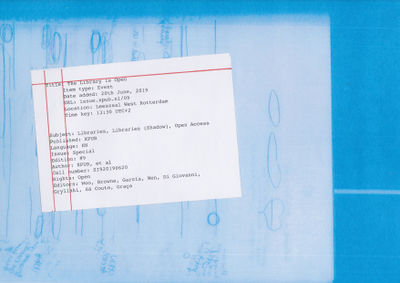
In the spring and summer of 2019 we developed The Library Is Open, a publication which focuses on the operations, actions, and roles of legal and extra-legal libraries. Central to this project is the community that forms around a collection of texts – the custodians of the collection and the readers.
The Library Is Open is the result of the third iteration of Interfacing the Law, an ongoing research project between XPUB and Constant (BE), which explores issues around extra-legal libraries, software and legal interfaces and intellectual property. Led by our guest editor Femke Snelting, we participated in many activities which were organised by invited guests:
With Bodó Balázs, an economist and researcher on shadow libraries, we analysed the gargantuan dataset of Library Genesis, to determine trends which indicate access to texts and the social, geo-political and economic aspects at play
.
With Anita Burato and Martino Morandi at the Rietveld Library in Amsterdam, we discovered the subjectivity of subjects and thorny issues of classification and representation
.
With other readers, we deepened our understandings of texts through collective annotations.
With artist and researcher Eva Weinmayr, who introduced us to The Piracy Project, we examined the possible motivations and differences between pirated books and their "source".
With open-source software such as Tesseract, pdftk, and LibreOffice (and many others) we explored the technical processes used during the creation of pirate libraries, and the hidden labour involved in this.
With fellow pirates, we considered the multiplicity of roles and activities involved in maintaining various libraries, such as Monoskop, Libgen, Aaaaaarg, Sci-Hub, Memory of the World, Project Gutenberg, +++.
With Dušan Barok, the administrator of Monoskop and an alumnus of the Piet Zwart Institute, we discovered how Monoskop was initiated and how it has changed over time.
The variety of our collective sessions, and the practical exercises we performed led us to organise an afternoon of three workshops that directly address the active role of piracy, rather than simply talking about it. Encouraging small, informal, collective actions, we wanted to challenge the ordinary, hierarchical presentation of research projects in the academic context, and individual notions of authorship.
When choosing a suitable venue for our event, we decided to ask Leeszaal (in Dutch "Reading Hall") to host our workshops. Situated in a busy, multicultural area of Rotterdam, Leeszaal exemplifies many values we sympathise with, particularly open access to knowledge, and a focus on the community that uses the space, not just for reading but for many other social purposes. These values we recognise (somewhat nostalgically) as reminiscent of public libraries of yesteryear. However, the landscape today is quite different, with huge online commercial repositories of texts (e.g. JSTOR), protected by paywalls which limit access to them, and in response the emergence of "shadow libraries".
In the following pages we invite you to wander through the dilemmas, outcomes and reflections that came out of our three different workshops, and interviews with people whose work is at the centre of the issues that each workshop uncovers.
Knowledge In Action explores the roles and activities within libraries, such as selection and inclusion of books. Interview with: Dubravka Sekulić & Leeszaal staff.
Blurry Boundaries reveals the hidden processes and labour between the publishing and distribution of physical and digital books. Interview with: Dušan Barok.
Marginal Conversations highlights the sociality of texts, and how they can become conversations through collective reading, annotation and performance. Interview with: Marcell Mars.
Yours in piracy, XPUB
Marginal conversations
Marginal Conversations is a workshop which explores collective reading, annotating and performing texts. We read, and write notes in the margins; usually in private, isolated from other readers. We come across texts with others' notes on them; the author unknown, their thoughts obscure. What happens when we share our notes, vocalise and perform them?
In this workshop, participants read, annotate and discuss the open letter "In Solidarity with Library Genesis and Sci-Hub", which asks for pirate library practices to come out from the shadows. This letter was selected for many reasons; it was an introduction for us to the thematic "Interfacing the Law", it's available in many languages, and presents an argument that generates interesting conversations. We compare annotations to detect common areas of interest and to also explore different methods, where readers can develop codes and techniques to extend the content of the source and express their personal understanding of it. The goal is not only to find areas of agreement, but also to discover tensions, disagreements etc. with the letter, which can also develop into fruitful conversations.
We leave traces of our reading, enriched by our doubts, sympathies, tensions and diverse understandings. We personalise the text, opening it up for collective conversations. Our voices occupy the space and leave traces on the text and in the library.
The Annotation Pack
Annotation traces
A Letter Performance
Transcription of recorded annotation performance at Leeszaal
PDF ARCHIVE
File:Workshopoutput.pdf
File:Scanannotations.pdf
File:Tracingpaper.pdf
File:Englishletter.pdf.pdf
File:Annotation pack.pdf
Workshop Rehearsal in PZI
Workshop plan - final draft | Artemis, Paloma, Simon
INTRODUCTION (5min)
Meet each other: have a quick round of saying something about ourselves and what do we know about pirate/shadow libraries. Short description of the steps of the workshop and let people know we'll be recording.
Overview of what happens in this workshop in one sentence:
1st part: Reading/Annotating, heatmap
2nd part: Discussion, Rehearsal of Performative reading and recording of performance.
Topic: pirate libraries - topic of special Issue 9
Text: "In solidarity with Library Genesis & Sci-Hub" letter
Aim: 2-3 sentences of what is the aim of this workshop. Why this collective reading-conversations matter?
- We see "annotations" as a way to express our understandings/questions/comments/disagreements/ tensions/positions about what we read. So we can discuss about it and form a collective understanding of the text. Our aims are to:
- open up a conversation about pirate libraries, through a deeper collective understanding of a specific text that refers to this topic (enrichment comes through collectively reading and annotating the text)
- develop ways in which texts can become conversations through annotating together
- make public what we have learned about pirate libraries and annotation, and to reflect on the public's response(s)
STEP 1: Reading/Annotating (15min)
Materials: "In Support of Library Genesis & Sci-Hub" English language letter (on A3 spread), A3 tracing paper, ballpoint pens (annotation pack)
Participants: Individual
Archiving step: collect tracing paper, carbon paper
- We provide the solidarity letter in an A3 pack
- Read the text individually
- Annotate the text on your english. (It will be traced through carbon paper to the tracing paper underneath.)
STEP 2: Heatmap and discussion through the annotations (20min)
Materials: Same as Step 1
Participants: Whole group
Archiving step: Photographs of annotated texts, discussion
- Create a "heatmap" of the text by placing tracing papers with annotations on top of each other, showing which areas are interesting/remarkable to others.
- We can focus in the most "annotated", thus "active", "interesting", "relevant" parts of the text. At the end of the heatmap stage we introduce the discussion by identifying common areas of annotation, and also listing things that need further definition. Why did you annotate this part? What is the "global north"? etc.
- Comment generally on the text, what was interesting? Did you make sense? Are there specific parts you want to discuss?
- Conclusions? Comments? Discuss the most commented.
- Discuss this experience and anything we want to discuss about pirate libraries, this text, our experiences.
- Collectively determine strategies to "amplify" specific parts of the texts that either
a) we all agree on
b) we don't understand
c) disagree on
d) we want to develop further
e) think are worth repeating/recording
STEP 3: Performative reading (20min)
Participants: All together (if more than 10, divide into two groups???)
Materials: Annotated "In Support of Library Genesis & Sci-Hub" letter, audio recording device (ZOOM rented from WdKA shop/smartphone), (maybe speakers?)
Archiving step: Voice recording
- Introduce by saying: "We are going to read aloud the text in turns, while also performing our annotations. Try to perform your comment to make your position/understanding of the text clear. If you have an annotation, please do or say something (e.g. interrupt, raise your hand, make a noise, use an accent, use intonation to convey emotion etc)."
The text becomes a "play", a performance, a discussion between us
- The purpose is to activate a text, by transforming it into a conversation through spoken annotation
- This reading will be recorded (ask)
- Decide on an "interesting" way of performing and record that. It could be more than one language in this audio piece.
OUTPUT:
At Leeszaal:
- Play the collective recording from speakers placed in shelves at Leeszaal (Bluetooth)
Later:
- Printed version with the overlaping of individual comments - heatmap - pocket version???
- Printed URL on annotated tracing paper to direct readers to the online versions of the texts?
- Bookmark or some object (it can be the pocket version) to introduce it in some books in Leeszaal, understanding that as a way to spread the letter (like sowing seeds)
1st personal workshop plan
*Pirate collective self-education
1st part: Bring your laptop and sit together. A collection of library items is provided, relevant to piracy/copyright/authorship. Choose one text. Where is it available in Rotterdam (library/school/bookshop/internet platform)? Search online. Is anywhere available for free or for what price? Is it available both in physical and digital form? Which pirate libraries do we know already? Name a phew and discuss there differencies. Try to download the chosen item through a pirate library. Discuss on our experience.
2nd part: Discussions will be the form of annotating the "source" in this workshop. Creation of a "local" forum. Verbal annotations help us towards forming shared understandings of the text. Read out loud collectively (and record?) part of the downloaded item.
Comments on the text? Which part was interesting or relevant to you? The resulting discussions can be recorded and published in a pirate library along with the "source", as an "extended audio version" of it?? It would be interesting to annotate again at another time, the extended audio version, after publishing it in a web-platform(e.g. soundcloud annotations on audio files). There are 3 stages of this experiment: 1) The first published content/source from an author 2) A temporary local community which reflects on the source through piracy and annotations 3) On top of the extended source, remote annotations through a pirate internet platform.
Practical info: Group of 5? Have a time limit for each "action". Take care of having internet connection, computers and recording infrastructure. Tools: 1)Record in decent quality a discussion of a group of people 2)Text annotation in audio file. Or audio annotation if audio file?
Aim
Create a temporary situated learning community supported by pirate libraries. Awareness of what is possible and what interfaces the law.
Think if that experience would be possible for everyone if we didn't use pirate ways of sharing "knowledge". Transformation of the "source", "translate" it in another medium (from text to audio). The extended version includes the temporary discourse about the thematic contained in the "source".
Questions of the workshop
How difficult it is to have access to a text in legal and extra legal means?
What happens when we pirate and annotate "collectively"? Can piracy be a social activivty? Why is it interesting to try this?
Role of annotation
Annotations in the form of discussions shape a space to learn from each other and have collective understandings.
In this process the "source" is enriched with our personal voices/stories/understandings. The "content" is then extended to a situation of learning.
Previous Workshop Ideas
A collection of pirate annotated research readers
Making public the process and materials for research, according to our experience. What is the "content" of a research? Apart from the final project with its bibliography, what about the different materials and proccesses that lead to it. What is regarded as knowledge?
It makes sense to work with something that is relevant to our personal interests and will be useful to us, or other students in the future? Working with readers that circulate at PZI? To bring together these scattered references. Base-collection would be the material that is already being annotated. Connect the references to the issues? Relate to workshops/lectures that took part? How do the references,materials become part of research? Multiple forms/levels of annotation.
It seems useful to create a place to gather
1) our researches and materials that lead to them
2) categorise the collections in thematics/issues (a different way of organising shared items in a library)
3) publish extended-augmented versions of processes, references, (multimedia) annotations along with final research projects
Questions:
- Digital/analog/multimedia?
- How is it (could it be made) interesting for other people outside PZI?
- What technologies?
- How do we create, collect and share these collections?
- Related to Rita's question about different media annotations. Relates probably to tancre's idea of augmented epubs.
Reflections
Intellectual ownership
Information, knowledge and culture are pivotal for human freedom and development. The way they are produced and exchanged in society radically affects the way we view the world as such or as it could be (Benkler, 2006). Intellectual products and those who own or have -- - exclusive or not - rights over them are thus regarded as crucial. The concept of intellectual ownership as established over the 18th century to become the foundation for shaping pertinent European law focused on the creator as the one who contributes in disseminating knowledge and subsequently in societal progress. This account of intellectual rights is connected to French Revolution and Enlightenment and justifies their humanitarian-idealist existence. Nevertheless, intellectual ownership law has always developed to protect the expression of an intellectual work in physical world as proved by the fact that laws focus on material means of reproduction of the works and rather than on knowledge itself. Keywords “execution” and “reproduction” appear with the important technological breakthroughs and evolve rapidly. This movement shows that despite the constant alteration of the ways of protecting intellectual ownership trying to adjust to technological innovations, the concept per se remains as is. Some, however, critiques, both prior and current, recognize intellectual ownership as an enclosure of knowledge and its means of production and reproduction.
Typography, as we know, was the invention of a novel form of copy equipment which led to the initial need for protecting intellectual rights. The first known European settlement in relation to intellectual works in Renaisscance Italy was nothing more than attributing monopoly rights to typographers while at the same time facilitating the control of what books were printed – a form of censorship. From this point on, the future of intellectual rights law has always been closely connected to freedom of expression and technological improvements in the means of transmission. In successive eras we observe transformations in the way of controlling and exploiting intellectual ownership most likely to be related to the interests of those who own the means of reproduction and transmission of the works, rather than to social benefit offered by smooth transmission of ideas. Knowledge as a common has long been forgotten. Nevertheless, in the event of a technological boom, when laws have not yet adjusted to new ways of reproduction and transmission of works, and new technological tools are not yet – even briefly – controlled by capital, we observe a more social approach to intellectual ownership and its transmission. Thanks to internet the liberation of reproductive means is bigger than ever while supporters of intellectual ownership do not seem able to argue for it against the various forms of questioning its value.
Era of information, digital world
Electronic computers alongside their hardware and software have aggresively entered our lives as exponentially evolving tools and seem to increasingly gain importance in working and social relationships. Small computer systems destined for professional use replaced the first large computer systems. Today, PCs are everywhere since they become increasingly affordable to average consumers and using new technological tools does not require any particular knowledge and skillset. The fact that hardware and software are means used for work but also during spare time by a large part of – especially western – population means that information technology creators and, mostly, those who manage it, largely influence our everyday time.
Digital revolution was a major breakthrough in knowledge production and transmission. Intellectual creation possibilities multiply and accelerate thanks to the use of PCs while new fields of knowledge and disciplines emerge in relation to them (program design, databases, webpages etc). Electronic networks development and the creation of a World Wide Web providing the base for instant access to a huge volume of digital documents proved crucial in the wide dissemination of information. The power held for years by traditional media – them being the major regulators of information dissemination started – started to shift towards internet users themselves – that is, citizens (Reynolds, 2006). Intellectual work products get digitalized having thus the capacity for reproduction and creation of quality copies, becoming this way instantly accesible. Electronic networks constantly evolve and technical upgrade of lines and speeds by providers allow us to exchange unprecedented volumes of information surpassing time and space limitations.
Todate, humans approached information as knowledge, transactions, commodities etc. This way, our efforts focused on opening land, air and sea passages, security and speed of transport means being the aim for a whole era. Nowadays, we observe that the core volume of data is transferred via informatics systems. There are many examples, one being research in health, national and international transport control, state apparatus functioning, national defence and money transactions among firms. In these new conditions, the question of who are going to become dominant administrators of the valuable new digital era raw material – namely, information – enjoying proportional benefits is crucial.
i) Shaping new social systems
However, alongside the fluid and unpredictable evolution of information technology and the huge competition among those gaining from it, alongside constant enclosures of new means, we observe the shaping of new social systems formed by their users. Contemporary information systems are not just machines but they are used by people and groups (communities) practically redifining ways of exchanging knowledge. The possibility given to average internet users to exchange opinions and information via a more participatory and less controlled communication channel favors the creation of fresh social media forms. Internet technology content sharing platforms promote the development of a set of (communication, social, political, economic etc) relations among isolated individuals or social groupings.
Social media being tools of transmitting and sharing information and data among users – ie, blogs, videocasts, wikis etc – and digital social networks favoring the development of internet bonds and communication among individuals or social groups sharing common ideas, interests or other traits (Καψή Α., 2006). Last, ever-increasing use of social networking means are an undisputable reality, the issue being not whether one would choose to use them but if and how they will be able to utilize them (Qualman, 2009).
ii) Information resources management
The question is whether distributers of all this knowledge and information flowing online are going to achieve control, optimal management and dynamic processing of its huge volume so that it orientates towards meeting social needs. The issue of accessing and circulating information is nothing new but goes hand in hand with our established perception of knowledge and intellectual creation per se: once we admit their being borne out of social wealth, then, the easier and smoother access to them is, the better they are promoted and boosted. “Intellectual property” is problematic in the first place and despite the core argument of its supporters being that it promotes creation by limiting access to it, it achieves the opposite. This is where we come across a contradiction: individual creation of our day highly originates in this wide information, knowledge and cultural objects transmission as well as in easy global access to them; but creators – as well as mediators – want to benefit from works they themselves created using one way or another nonmaterial goods offered by information society.
iii) Gradually overcoming copyrights
In the present situation intellectual ownership concept is maybe stricken more seriously than ever. Its supporters are unable to delay rampant transmission of all the more intellectual works achieved via their digitalization. Preceding legal intellectual property rules developed to control - totally different to the existing - forms and methods of expressing information. They are thus hindering maximizing benefits of future technologies. One such benefit emanates from the fact that images, texts, videos, or music subject to intellectual rights taking digital form are redistributed and recycled among internet users. This way, 2nd generation internet technologies alongside their philosophy – according to which users are not just passive information “consumers” but they are pushed to create and exchange content (Kaplan and Haenlein, 2010) – are utilized. Distributed material is thus enriched (variation, combination, processing, montage, annotation) and is presented on various blogs, social media and other online sites. This is a way of widening the concept of the creator and the content since anyone can now become more or less of an artist or a writer. A different level of relations emerges between creator and beneficiary as well as regarding the entirety of intellectual work which may be shared with little or no cost just by using a terminal anywhere on the planet.
iv) New legal frameworks
The necessity for updating legal status on intellectual ownership is clear. New laws set forward at national and supranational level are not however based on understanding fresh data and redifining this phenomenon but attempted to repress it by means of the good old methods. Critique on these laws came from various directions and regarded infringement of human rights, privacy, state authoritarianism, internet entrepreneurship restrictions etc.
Justice can no more decide alone the future of intellectual rights – especially regarding each individual country: it is a field of negotiations for many interest groups, foundations, ministries, firms, organizations, shareholders, artists, scientists. Firms are progressively becoming more relevant since in the new context some economic sectors emerge as highly profitable. The major reaction against new legal framework comes from companies enjoying the perks of bypassing intellectual rights such as Google, Facebook, Yahoo, etc. New giant tech companies are not interested in protecting intellectual ownership for their activities do not rely on it: their power is built upon the model of a plethora of – illegal or not – information travelling in cyberspace and their profitability stems from their expansion which provides them with ads and funders. They thus attempt to become dominant administrators of information circulating online so as to drain proportional profits.
v) Cyberpiracy
At the same time IT companies compete each other, the phenomenon of “illegal” information trafficking – that is, without consent on behalf of the owner: the so-called piracy which emerged from the technical convenience of “breaking-in” digitalized intellectual property and now, being massive, tends to become uncontrollable. A majority of public opinion views the practice of intellectual rights infringement as legal. Pirates constantly invent new ways of breaking intellectual ownership monopoly by limiting, through their action, legal intellectual-artist creation trade profits. They both help people progressively familiarize with digital reproduction and act as an anonymous “mediator” in free distribution of intellectual works. It is noteworthy that cyberpirates act in the field of circulation and distribution of intellectual works but not in the process of their production.
In these new conditions and while new means create new possibilities for users, intellectual ownership, as it is established, seems to block them. The old paradigm was first challenged on behalf of the sector mostly striken by enclosures – informatics - as a result of realizing new conditions. These challenges initially came up through individual initiatives but were soon phrased in different contexts gaining social features, putting forward a different way of creating and using software and intellectual goods in general, ending up in rejecting established intellectual ownership concept. The perceptions leading to this new paradigm spread rapidly among developers and other PC users, creating an online community, ultimately evolving into a movement extending beyond informatics.
Notes II
On knowledge enclosures
The ownership of knowledge – intellectual ownership – is traditionally accompanied by large power for those owning it. Knowledge, in the history of the western world, was never free and accessible for all. From the monasteries of renaissance to modern large companies patents, or even universities libraries, always someone had and have exclusive right to this knowledge and the benefits it implies. However, at the same time, it was never possible for knowledge to be totally subtracted from the society which produced it and become completely commodified, a fact that is proved by the multitude of intellectual creation commons. These correlations, between knowledge monopolies and intellectual commons gain massive importance, especially in the modern era and ultimately prove critical for any human activity sector. But, in order to understand what happens with knowledge ownership, we have to examine its history and the laws framing it.

